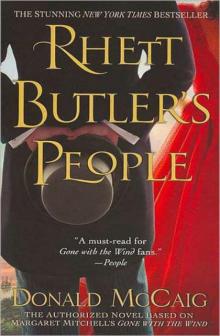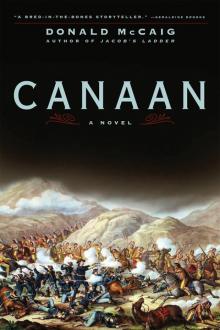- Home
- Donald McCaig
Ruth’s Journey Page 9
Ruth’s Journey Read online
Page 9
“Philippe’s Indian motifs,” Count Montelone supposed.
Augustin’s hands were so cold, he clamped them between his thighs.
Three gentlemen emerged from the Indian coach. The flash of Philippe Robillard’s lucifer match set spots swimming in Augustin’s eyes.
“Pardon.” The Count left to confer with his counterpart. The doctor was as reserved and unapproachable as his black bag. Augustin smiled at Wesley, who shook his head ruefully.
Augustin’s hands were ice. How could he pull a trigger?
Augustin went into the cemetery, where grave mounds clustered against the south wall. Apparently the Hebrews didn’t believe in headstones.
As the challenged party, Evans and his second had chosen weapons and venue. Now, the Count asked Augustin what distance he preferred.
“I hadn’t thought . . .”
“Are you a good shot?”
“I don’t think so.”
“Fifteen paces then. You may miss, but so may he. Philippe assures me Evans is no marksman.”
“Le Bon Dieu.”
“You will each fire once, after which, if one of you cannot continue, honor is satisfied. After blood is shed an apology may be offered.”
“By Evans.”
“Certainly by Evans. His blow gave offense.”
As the seconds chose their principals’ pistols, the rising sun limned the black lip of the cemetery wall with gold. How beautiful it was!
Montelone: “Do not cock until you are ready to fire. Cock as you raise the pistol, aim for his middle, and touch the trigger.”
“Oh. So easily it is done.”
The pistol was a lead lump in Augustin’s hand.
At Philippe’s cracked-voice instruction, the two men stood back to back, almost touching. Augustin could feel Evans’s body heat. The butts of their pistols almost touched, which puzzled Augustin until he realized his adversary was left-handed. For some reason this detail made him want to weep.
One, two, three . . . paces counted as if each were an important personage. Augustin marched toward the gray-brown heap of a newly filled grave. Blackened flowers curled atop the dirt.
“Turn. Gentlemen, turn and fire!”
As he turned, Augustin smiled. What fools men are! What fools! He raised his pistol because Evans was raising his. Evans seemed smaller than Augustin remembered. Augustin’s pistol lifted toward the horizontal but wasn’t level when Evans’s pistol produced a puff of white smoke but no explosion. The Count cried, “Misfires are the same as shots fired! Captain Fornier, you may fire!”
Still smiling at this absurdity, Augustin pointed his muzzle to the heavens. The trigger was so light it seemed to discharge by itself. The explosion was louder than he expected, and the pistol jerked at the web of his hand.
While the seconds conferred, Augustin eyed his enemy through a haze of benevolence. Good fellow! Brave fellow! The seconds approached Augustin. The Count asked, “Evans did strike you, did he not?”
Puzzled, Augustin replied, “He was holding my wife’s hand.”
“That is no matter. He struck you?” The Count’s thin lips were noticeably blue. “Then we continue. You must meet again unless Mr. Evans consents to be caned.”
“What?” Augustin frowned so hard it hurt.
The Count explained as if to a child. “Under the Code Duello no gentleman can strike another. That physical blow is, Captain Fornier—that blow is the unforgivable insult.”
Philippe’s face was shiny with sweat. “Mr. Evans deeply regrets his actions in the orangerie but cannot consent to be caned.”
Cane him? Why should Augustin cane him? He had nothing against this fellow. He shook his head no, but the Count was adamant. “Captain, as you are a gentleman, you must blaze.” He shrugged. “It need not be fatal. Blood invariably satisfies honor.”
As the seconds reloaded pistols, Augustin inspected the fresh Jewish grave, wondering what the moldering flowers had been.
Philippe reloaded wearing a granite grim expression, exaggerating his smallest hand movements. He wouldn’t err again. Augustin couldn’t help smiling. Everybody smiled at Philippe. Philippe never noticed, and the smilers never meant offense.
Augustin sat on the grave’s border stones while Evans leaned against a wall stuffing his pipe. A cigar! A cigar would taste wonderful, but Augustin’s hands were shaking too much to light one.
Augustin’s mind escaped to the everyday. He must ask Nehemiah to change the shop window display. He needed new socks. After this morning he would buy everyone in Frère Jacques a drink. Solange wouldn’t dare object! This once, mightn’t she join him?
After the seconds primed the pistols, they gravely shook hands. Evans tapped his pipe out in a shower of sparks.
We are as sparks.
The principals were told to stand where they had fired before, pistols at their sides. On command they would simultaneously raise their pistols, aim down the long sightless barrels, and fire.
“Evans might not fire.” Augustin’s pistol rose up to arm’s length. He felt small and dirty and tired.
Deportment
THE SAME WEEK he fatally shot Captain Augustin Fornier, Wesley Evans had paid nineteen cents per pound for middling cotton. Two years later, on Wesley and the Widow Fornier’s marriage day, high middling brought only ten cents. Savannahians blamed the poor prices and attendant hard times on President Jefferson, who had embargoed all American goods, even cotton, to France and England. Although both warring nations had violated American neutrality, Britain, who’d impressed thousands of American seamen, was the worse offender, and British merchant ships took the trade Americans had lost. There was smuggling and New England mills took up some slack, but Savannah cotton factors were in trouble.
Solange hadn’t ever imagined Augustin might be killed: that outcome had never crossed her mind. Foolish men—like Augustin—were humiliated in affairs of honor or they apologized or at worst they received a slight, gallant wound. Men postured; that’s what men do! In her secret heart Solange may have imagined brave men fighting over her was romantic, like the exquisitely sensitive novels she no longer bothered to read.
That dreadful morning, Philippe’s coach brought Augustin home. Ruth rushed to it, shrieking. Solange commanded her to stop screaming, please stop, please stop, but she didn’t.
Philippe offered awkward condolences. Count Montelone assured the widow that the affair had gone off properly and honor been satisfied. “There will be no untoward questions, madame. You may rest assured.” Ruth disappeared down the street, heels flying. Solange’s mouth was dry and her throat hurt.
Pierre Robillard managed everything, or Nehemiah did. Solange went where they told her and sat between them in St. John the Baptist’s front pew. Ruth didn’t come home. Regrettably, Louisa and Clara were indisposed and couldn’t attend. Apparently much of Savannah society was similarly indisposed. Frère Jacques habitués attended and the O’Haras made an appearance, but nobody followed the hearse from the church to the grave.
The third, or perhaps it was the fourth, morning afterward Count Montelone called with effusive respects.
“You knew my husband well?”
He informed her Captain Fornier had been a gallant gentleman of “the old school.” Delicate as a cat unwinding a skein of yarn, Montelone said that, of course, he didn’t wish to intrude but under the circumstances (her husband had been a clerk at L’Ancien Régime, had he not?) the Count wished to offer tangible assistance to the Widow Fornier. He did a little buying and selling. Mrs. Fornier’s handmaid. How was she called?
Solange couldn’t say Ruth’s name. Naming her would declare so much more than she wished to. She shook her head. “No, monsieur. She isn’t here at present.”
When Montelone smiled, Solange wished she hadn’t said anything. Had she
run away? Might he make inquiries? He knew reliable slave hunters. Unscrupulous hunters sometimes caught and sold runaways without notifying the runaways’ owners. Ladies couldn’t fathom the mendacity of some men . . .
Solange found strength to say, “She is no runaway. I will not have you make inquiries on my behalf.”
“Why of course not, madame. Wouldn’t presume . . .”
And so on and so on, but once she had him out of the house she went to Nehemiah.
Ruth had been seen at the market, but nobody seemed to know where she slept at night. Yes, he’d make inquiries. Yes, he’d be discreet. That Count, yes, that one.
The next morning, or perhaps the morning after, Wesley’s servant delivered this letter:
Dear Solange,
Please accept my sincere regrets. Your husband was a braver man than I.
Before this terrible affair I was ignorant of Southern customs. I would give anything to be ignorant still!
I know you as a sensible, virtuous woman and trust you will ignore the malicious gossip which discredits the gossipers, not a blameless lady!
As you will understand, I cannot call on you. But I stand ready to assist you materially. Nehemiah is a reliable go-between.
Like you, I mourn Captain Fornier. He held fire when he might have shot me down.
Your Obt. Servant, Wesley Robert Evans
Savannah’s disapproval fell on Solange. Mr. Evans had been the challenged party, and, as every Georgia child knows: Yankees don’t have good sense. The deceased captain’s wife’s shameless behavior had “sowed the seeds of tragedy” (Antonia Sevier’s happy phrase), and wags wondered (with a lewd wink) exactly what other “seeds” had been “sown.”
Savannah’s better sort believed Solange had encouraged her husband’s fatal challenge to make way for his slayer, her Yankee paramour.
In dramatic contrast, Wesley Evans got the approbation accorded the gentleman who’d blazed. Wesley despised these compliments, sometimes in terms that might have occasioned a challenge had circumstances been less exceptional and Wesley not a deranged Yankee. Unwelcome compliments gave way to admiring nods, hat doffing, and knowing looks. Wesley buried himself in work. Every shipowner and planter in the Low Country soon knew him by sight. Lanterns in the R & E offices burned late into the night.
No one was surprised when a hotel porter found Count Montelone dead in his room. At first, from the anguish written on the dead man’s face, poison was suspected, but the superintendent of the watch ascertained that the Count had eaten no supper that evening, contenting himself with a single orange peeled by himself.
When Ruth came home, Solange asked, “Did you know Augustin was going to die?”
Ruth wouldn’t meet her eyes. “I sees some things.”
“Where have you been?”
“I gots to catch my breath.” Vehemently she repeated, “I gots to catch my breath!” Her icy fingertip touched her mistress’s cheek. “You gonna marry that man. Yes, you is. Better be damned for what you is than what you ain’t.”
In due course, when Solange did marry Wesley, Antonia Sevier claimed she’d done so to demonstrate contempt for decent opinion, a notion which, in later years, Solange herself embraced because she couldn’t admit—no well-bred young lady of Saint-Malo and certainly no Escarlette daughter could confess—her inexplicable, weak-kneed urgency when she and Wesley fled their wedding reception to tumble into their wedding bed.
Solange’s second husband was as shrewd and determined as she, but Wesley found the humor in it. “When God looks down from His Heaven,” he said, “He sees a teeming anthill where the rich ant can’t be distinguished from his servant.”
“A penny is a penny,” Solange sniffed. “In anthill or Heaven.”
Two years and nine months after the marriage, Mrs. Wesley Evans gave birth to a healthy daughter, Pauline. The infant’s christening and subsequent reception at the Evanses’ residence were attended by young Savannah, uninterested in old scandals cherished by last century’s grandees with that century’s manners.
When Solange suggested Ruth be Pauline’s Mammy, Wesley objected. “Must every Southern child have a Mammy?”
“Mammies allow Southern ladies to cosset their gentlemen,” Solange said with a crooked smile no Escarlette would have approved.
Wesley cleared his throat. “Ruth is so young.”
“Coloreds mature faster than whites. Ruth is a woman, not a child.”
“I don’t believe I’ve known anyone like her. Rain, sleet, high wind, good times, hard times . . . Our charming Ruth never drops her smile.”
“You object?”
“I do wish I knew what Ruth was really thinking.”
“Take it from me, dear. You never shall.”
Ruth took to child rearing naturally, and Pauline’s mother cosseted her husband to both parties’ entire satisfaction.
* * *
After the embargo (“damnbargo!”) was repealed, Wesley expected the cotton trade to flower, but British and American politics hindered cotton exports until 1812, when war was declared with the British, who couldn’t believe the United States was no longer their colony.
Louisa Robillard and her daughter, Clara, took sick the first week of August and were buried the eighth of September 1812. The utterly devastated Pierre offered his half of R & E Cotton Factors to his partner. Thanks to the prenuptial agreement Wesley had willingly signed, Solange remained a femme sole, but she hesitated not twenty-four hours before providing capital to buy out Pierre.
Blockaded by the British fleet, Savannah languished until Andrew Jackson slaughtered Britain’s Indian allies at Horseshoe Bend and, not long after, British regulars at New Orleans. The Treaty of Ghent ended the war and lifted the blockade. Church bells rang, and middling cotton rose to thirty cents.
In Savannah, hammers banged, saws rasped, and Bay Street was so obstructed with cotton and lumber wagons, society ladies promenaded on Jameson Square. The O’Hara brothers expanded their mercantile, and nobody snickered when James O’Hara bought a carriage. When Wesley offered to return Solange’s investment in R & E Cotton Factors, she laughed. “Build me a house the Havershams will envy,” she said. “Pink.”
“Pink?”
Her mouth tightened into an expression with which Wesley was too familiar.
“Pink it shall be,” he said and grimaced. “Pink?”
Although there was a continent of piney woods behind the Jewish Cemetery and new homes were rising there, society folk still built in town. Wesley bought two decrepit frame houses on Oglethorpe Square and had them torn down.
When Ruth asked, “Master Wesley, why you wreckin’ perfectly good houses?” he said, “So we can be better than the Joneses.”
“Who them Joneses?”
Pauline was a quiet infant and grew into a docile child, who only needed to be told what to do to do it. Even as a toddler, she was homely, though Ruth didn’t think so for a minute. Ruth slept on a pallet beside the child’s crib and woke to rise and banish her nightmares.
Young Mammy Ruth wore a plain blue shift and a modest, checked head scarf. She was the youngest Mammy in Reynolds Square and held her head high but didn’t speak unless spoken to. Baby Pauline was always clean and properly dressed for the weather, and Toddler Pauline was so neat she almost seemed starched. Older Mammies accepted the young French Negro and opened their hearts to her. Mammy Cerise, who’d reared the Minnies’ children, took a particular liking to Mammy Ruth.
Heat a cloth in melted tallow for colic.
Corn shuck tea cures measle rash.
Chinaberry’s good if child passin’ worms.
Child don’t cry ’cause she’s bein’ contrary. There’s somethin’ wrong with her.
Little Pauline’s father arrived at R & E Cotton Factors before the sun silvered t
he river and worked until the lamplighter made his rounds.
The Evanses ate supper with their daughter and supervised the child’s bedtime prayers. Since Wesley was a Methodist, Solange, Ruth, and Pauline attended Mass without him.
Solange directed the Pink House construction. Excepting her novel color, Solange wanted a traditional “Savannah Box” and hired the elderly builder Mr. Haversham recommended. John Jameson had built a dozen Boxes and had (as Haversham noted) “made his reputation decades ago and won’t hazard it. He’s a worrier.”
John Jameson was a glum little man who fretted about the Evanses’ double lot, which was lower than neighboring lots so water must drain into the Evanses’ basement. “This is the Low Country, madam,” he reminded Solange. “ ‘Water, water everywhere,’ as Mr. Coleridge likes to say.”
Jameson admitted fashion favored the newfangled English half basement, but the traditional pillar foundation—with no basement, madam—had served for many years! Madam may not know the brick cladding she preferred was dear. Very dear. Jameson could show her any number of wood-frame survivors of mighty hurricanes! An attic cistern? Dear me! But why should Madam understand building mechanics? Savannah ladies are much too fine for such “practical” considerations. How to support such a device thirty feet in the air? A thousand-gallon cistern? Madam, a pint’s a pound the world around. Yes, Mr. Jameson was aware the Robillard home had such a cistern—plus some very unusual plumbing. Mrs. Robillard—may God rest her, ma’am—had embraced novelty. Perhaps Madam hadn’t heard about the leak ruining the plaster in the Robillards’ upstairs bedroom? A room for your Mammy Ruth beside the nursery? Mr. Jameson had never heard of such an arrangement and deemed it—intending no criticism—unseemly. Mammies—as everyone knew—slept on pallets at the feet of the children’s beds. A circular staircase, madam? To be sure, the circular staircase is traditional, but Jacob Bellows, Savannah’s master stair builder, is, alas, two years deceased and the only other master in the Low Country works in Charleston. The Charleston stair builder is (Jameson lowered his voice) “a free colored.”

 Eminent Dogs, Dangerous Men: Searching Through Scotland for a Border Collie
Eminent Dogs, Dangerous Men: Searching Through Scotland for a Border Collie Rhett Butler's People
Rhett Butler's People Canaan
Canaan Jacob's Ladder: A Story of Virginia During the War
Jacob's Ladder: A Story of Virginia During the War Nop's Hope
Nop's Hope Ruth's Journey: The Authorized Novel of Mammy From Margaret Mitchell's Gone With the Wind
Ruth's Journey: The Authorized Novel of Mammy From Margaret Mitchell's Gone With the Wind Nop's Trials
Nop's Trials Jacob's Ladder
Jacob's Ladder Ruth’s Journey
Ruth’s Journey Eminent Dogs, Dangerous Men
Eminent Dogs, Dangerous Men